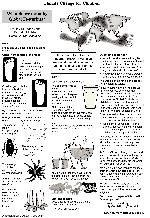|

This A4 page from KUCA News could be included in your newssheet. Thanks to Marnie, the editor, for permission to reproduce it here. You can download it as a pdf (800k) or gif file (400k).
It is based on the following text, which gives two quick examples to help convey the ecofootprint concept. The second example includes more theology, which could easily be included in the first.
Footprint idea
I need one volunteer to be an “average” human. Stand in the middle.
Consider their left foot. It represents all the resources and energy and waste needed to feed them and provide other goods for their use.
Consider their right foot. It represents all the resources and energy and waste needed to move them around, provide essential services, and house them.
By this reckoning, the average Indian would only have one foot to stand on.
Get another volunteer up
The average Italian would need four legs!
another
The average citizen of the UK six legs!
Another
The average Australian eight legs!
Another
And the average American is a ten legged beast!
For the kids-
Has anyone ever met a ten legged human? Or an eight legged one? Hmmm.
And this completely ignores all the other animals and plants on the planet, which we don’t directly eat or use.
If we wanted to leave half the planet for them, then we would only have one hectare each: we would all need to be consuming the same as an average Indian.
Glass of water idea
NEED: Jug full of water (pref with clear sides); 9 glasses or 8 glasses and another jug.
Hold up jug mostly full of water
This jug is our planet earth. Full of “resources”
Every year we can extract one glass of resources to make things and process our waste.
(fill a cup from the jug)
And the energy of the sun, plus natural processes, will magically fill it up again ready for next year.
(refill the jug from the “sun” (another cup or another jug)
So: every year, we can use one glass renewably or sustainably.
At the moment, we are drinking roughly this cup, plus 10%.
Pour a little bit of water into a second cup.
In other words, every year the level in the jug gets a little lower. Its running out.
This “running out” is seen in ocean pollution, land degradation, deforestation, species extinction, diminishing oil reserves and so on.
How long we can continue to use more than is replenished depends on how much water was in the jug in the first place. We could also get an idea if we could somehow measure how much water is left in the jug now.
How full do people reckon the jug is at the moment?
[point out that this could lead to a good discussion in congregations, and presentation of things like oil reserves, amount of land cleared, # species extinctions, Co2 levels etc]
However much we have in reserve, we are using more than we have.
I say “we”, but of course, some people are taking big gulps [gulp from the cup] so others get only tiny sips [take a sip], and are thirsty all year round, or are drinking polluted water.
If everyone took a sip as big as the average Adelaidian, we would need four cups to share around. Four planet earths. (get out the other three cups and fill with the jug)
Of course, this would only provide for humans and our domestic animals. It would be a world with no nature reserves, no marine parks, no wilderness, no other species except humans, pigs, cows, goats and so on.
Four planet earths. If God cares nothing for other animals, and if we don’t either, we still need four glasses for all the humans to live like the average Adelaidian. If everyone lived like that, how fast would the jug empty: with a 300% rather than 10% deficit?
For those of us who think that God does care about other animals, and that it would be fair for our species to consume only, say, half the resources of the planet, to make room for forests and plains and reefs and so on, if we want to have the Adelaide hills as reserves and not farms, we would need EIGHT planet earths.
Get out another four glasses, but leave empty.
Is our relationship with the rest of creation a faith issue?
It doesn’t matter if you are a tree hugging nature loving hippie or focussed purely on humanity and human needs.
Until we need neither four, nor 8 planets, or until we discover 3-7 in another galaxy and find a way of getting everyone there, it is probably the faith issue of our time.
Speaking of faith, this all comes back to those core concepts of our faith doesn’t it, or core challenges:
Love neighbour as yourself
Do for others as you would have them do for you
Whatever you do for the least of these…
Give to those who ask of you, expecting nothing in
return
Who is the neighbour? The other? The least of these?
At a bare minimum it is all other humans. So we are at the four earths / four glasses of water dilemma.
But through the history of our tradition we see neighbour and other being expanded from men to include women, from Jews to include all humans (even enemies). In our day can we really leave it there? Or are we being called to see in other animals, in other life forms, neighbour, other, least of these? If so, to what extent? How many earths do we need?
|

